高考英语语法讲练—倒装句
图片预览
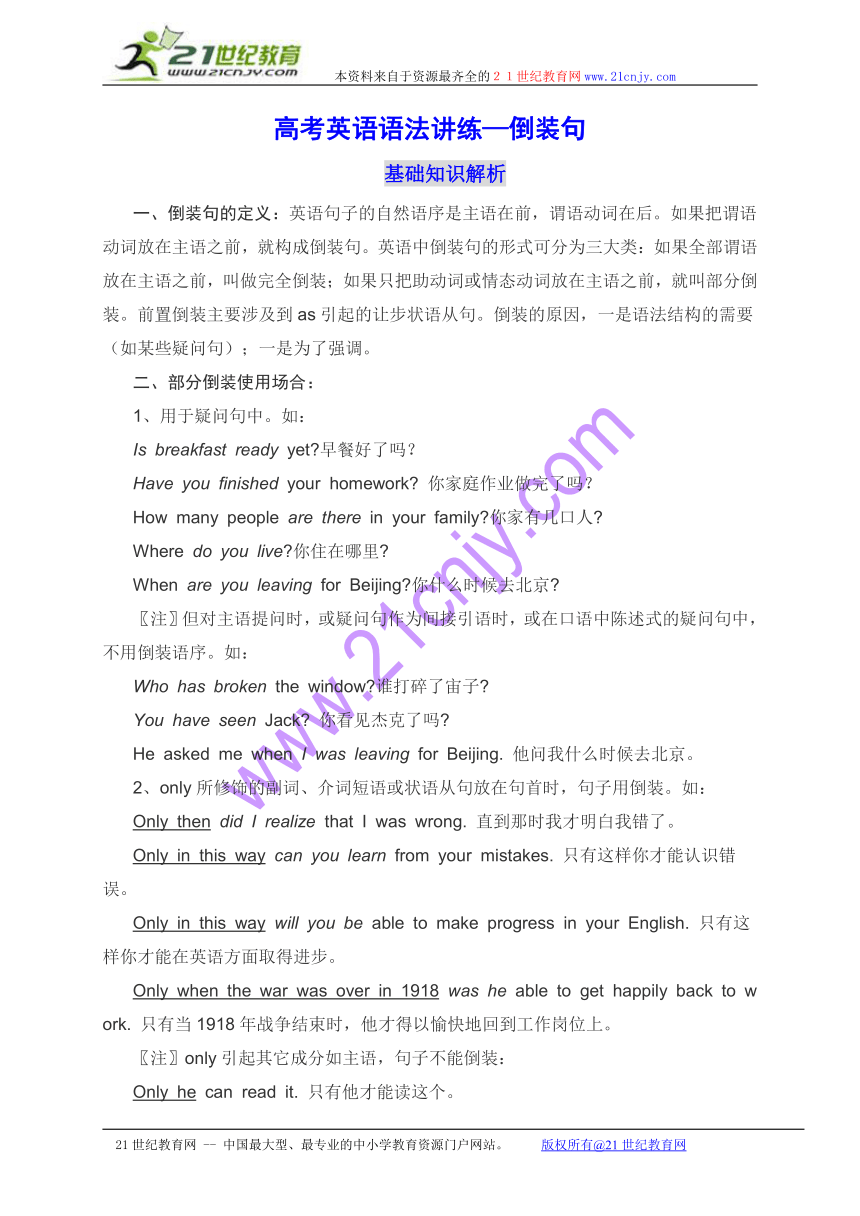
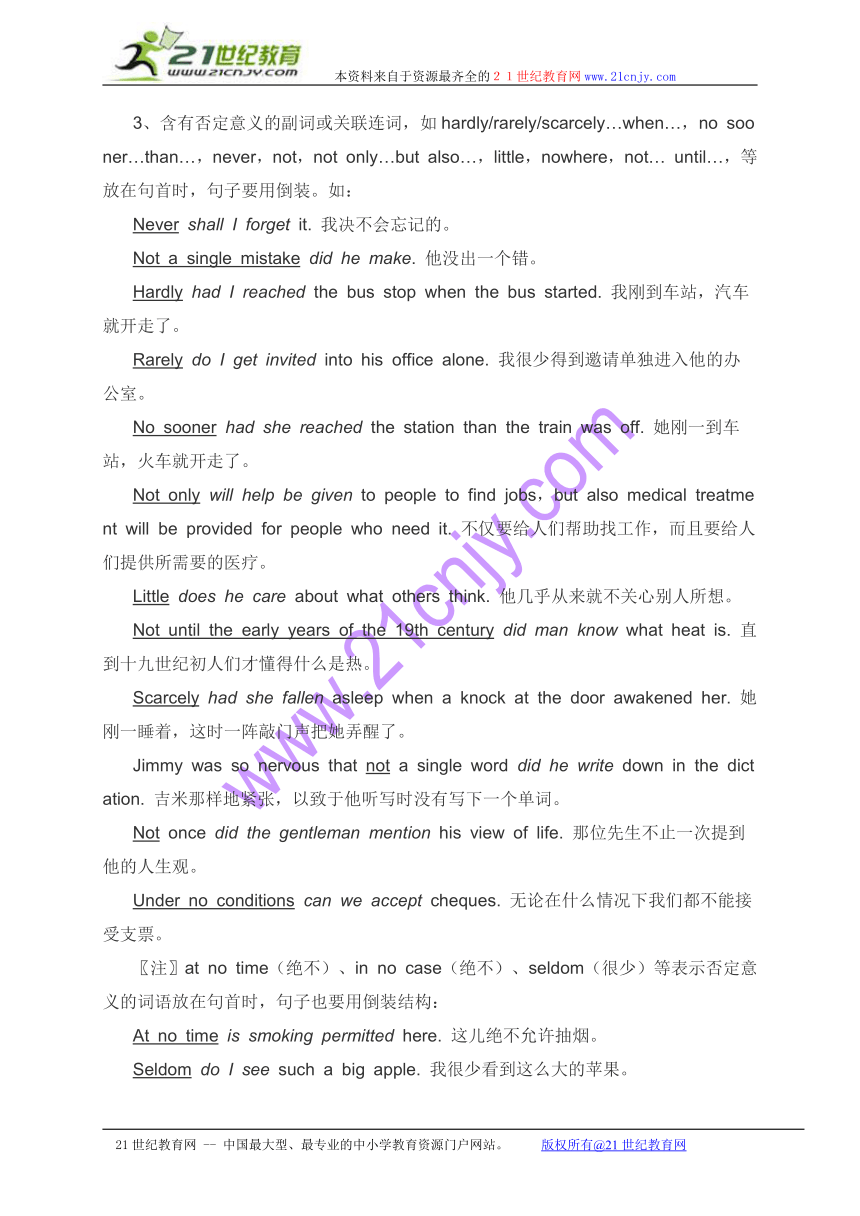
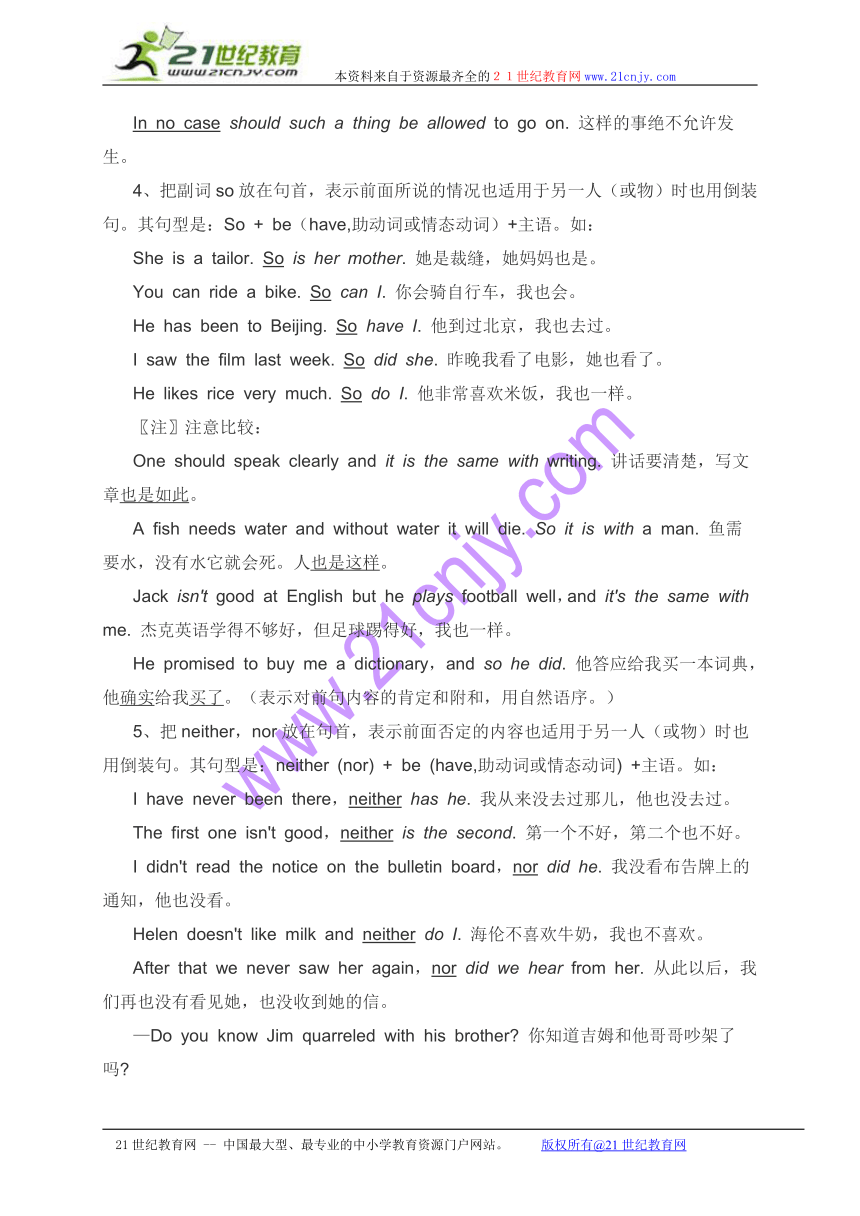
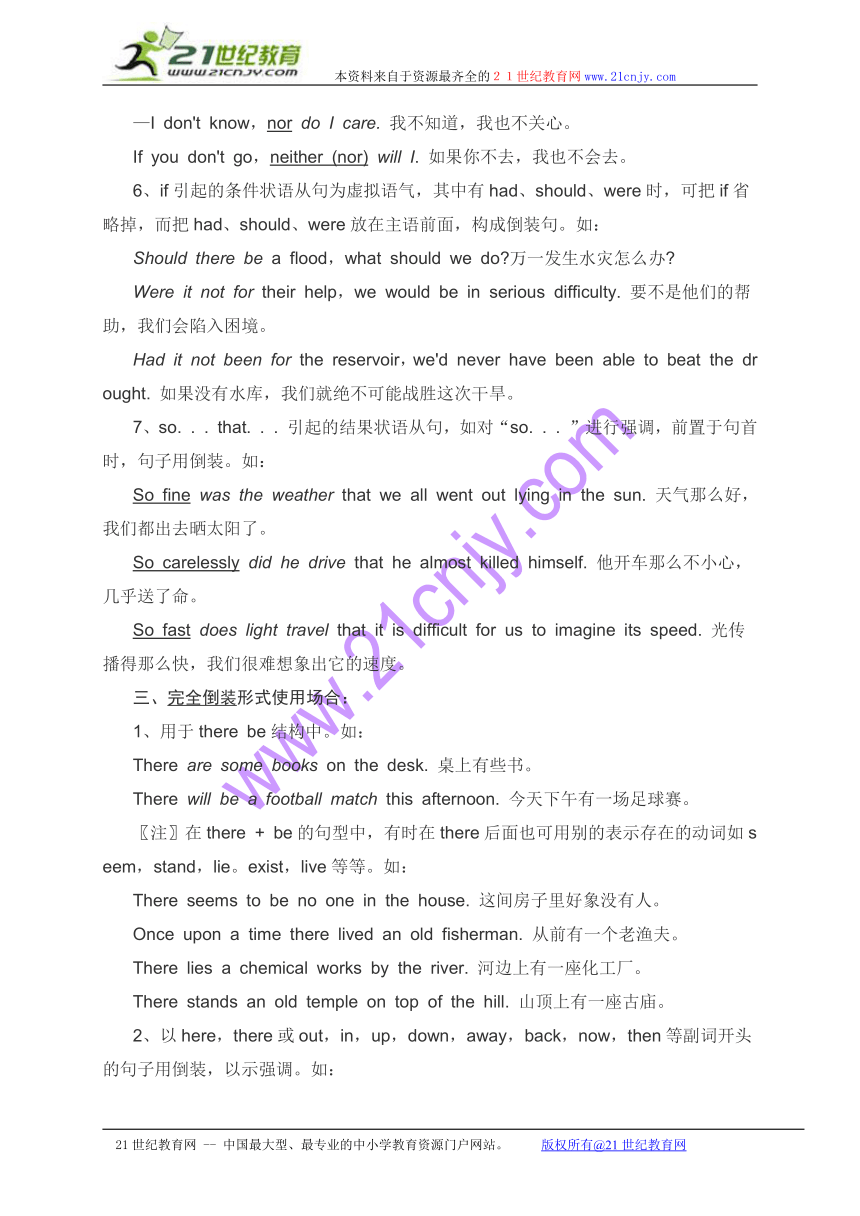
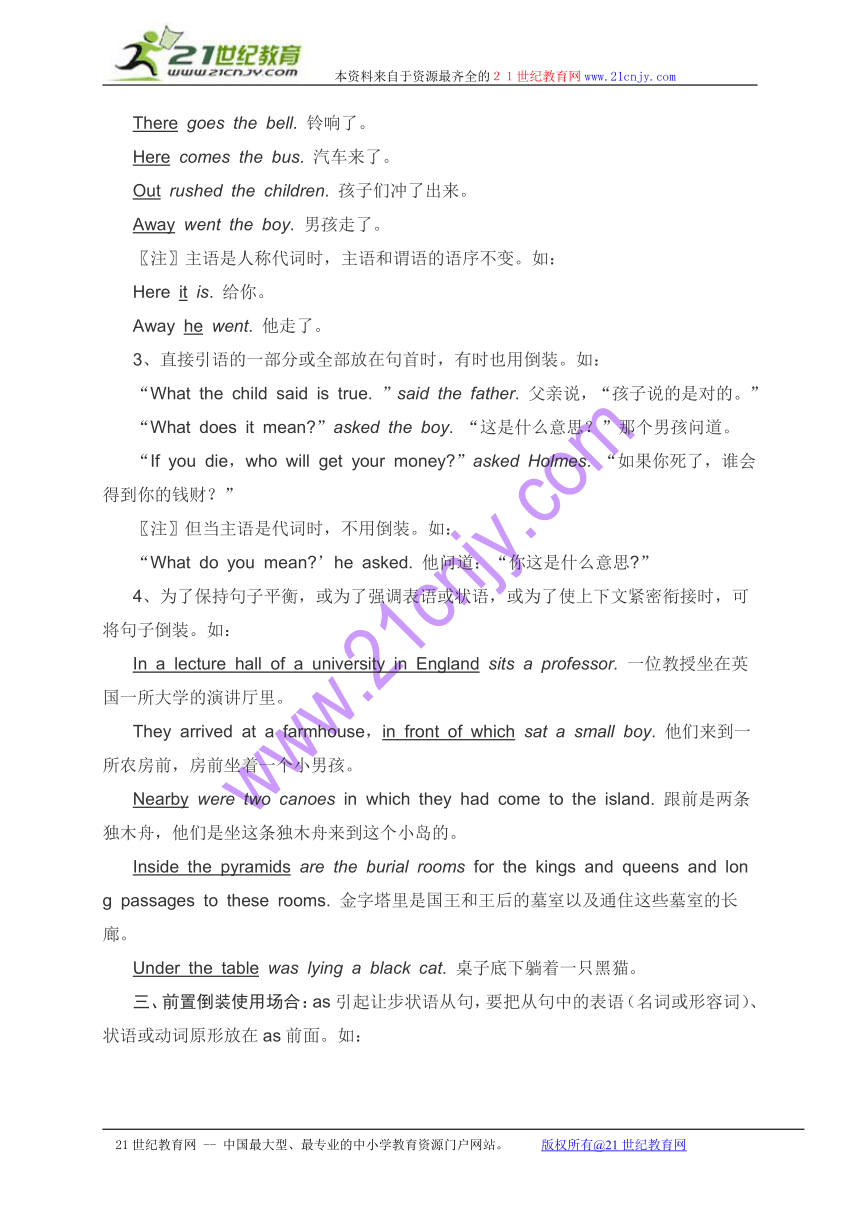
文档简介
本资料来自于资源最齐全的21世纪教育网www.21cnjy.com
高考英语语法讲练—倒装句
基础知识解析
一、倒装句的定义:英语句子的自然语序是主语在前,谓语动词在后。如果把谓语动词放在主语之前,就构成倒装句。英语中倒装句的形式可分为三大类:如果全部谓语放在主语之前,叫做完全倒装;如果只把助动词或情态动词放在主语之前,就叫部分倒装。前置倒装主要涉及到as引起的让步状语从句。倒装的原因,一是语法结构的需要(如某些疑问句);一是为了强调。
二、部分倒装使用场合:
1、用于疑问句中。如:
Is breakfast ready yet 早餐好了吗?
Have you finished your homework 你家庭作业做完了吗?
How many people are there in your family 你家有几口人
Where do you live 你住在哪里
When are you leaving for Beijing 你什么时候去北京
〖注〗但对主语提问时,或疑问句作为间接引语时,或在口语中陈述式的疑问句中,不用倒装语序。如:
Who has broken the window 谁打碎了宙子
You have seen Jack 你看见杰克了吗
He asked me when I was leaving for Beijing. 他问我什么时候去北京。
2、only所修饰的副词、介词短语或状语从句放在句首时,句子用倒装。如:
Only then did I realize that I was wrong. 直到那时我才明白我错了。
Only in this way can you learn from your mistakes. 只有这样你才能认识错误。
Only in this way will you be able to make progress in your English. 只有这样你才能在英语方面取得进步。
Only when the war was over in 1918 was he able to get happily back to work. 只有当1918年战争结束时,他才得以愉快地回到工作岗位上。
〖注〗only引起其它成分如主语,句子不能倒装:
Only he can read it. 只有他才能读这个。
3、含有否定意义的副词或关联连词,如hardly/rarely/scarcely…when…,no sooner…than…,never,not,not only…but also…,little,nowhere,not… until…,等放在句首时,句子要用倒装。如:
Never shall I forget it. 我决不会忘记的。
Not a single mistake did he make. 他没出一个错。
Hardly had I reached the bus stop when the bus started. 我刚到车站,汽车就开走了。
Rarely do I get invited into his office alone. 我很少得到邀请单独进入他的办公室。
No sooner had she reached the station than the train was off. 她刚一到车站,火车就开走了。
Not only will help be given to people to find jobs,but also medical treatment will be provided for people who need it. 不仅要给人们帮助找工作,而且要给人们提供所需要的医疗。
Little does he care about what others think. 他几乎从来就不关心别人所想。
Not until the early years of the 19th century did man know what heat is. 直到十九世纪初人们才懂得什么是热。
Scarcely had she fallen asleep when a knock at the door awakened her. 她刚一睡着,这时一阵敲门声把她弄醒了。
Jimmy was so nervous that not a single word did he write down in the dictation. 吉米那样地紧张,以致于他听写时没有写下一个单词。
Not once did the gentleman mention his view of life. 那位先生不止一次提到他的人生观。
Under no conditions can we accept cheques. 无论在什么情况下我们都不能接受支票。
〖注〗at no time(绝不)、in no case(绝不)、seldom(很少)等表示否定意义的词语放在句首时,句子也要用倒装结构:
At no time is smoking permitted here. 这儿绝不允许抽烟。
Seldom do I see such a big apple. 我很少看到这么大的苹果。
In no case should such a thing be allowed to go on. 这样的事绝不允许发生。
4、把副词so放在句首,表示前面所说的情况也适用于另一人(或物)时也用倒装句。其句型是:So + be(have,助动词或情态动词)+主语。如:
She is a tailor. So is her mother. 她是裁缝,她妈妈也是。
You can ride a bike. So can I. 你会骑自行车,我也会。
He has been to Beijing. So have I. 他到过北京,我也去过。
I saw the film last week. So did she. 昨晚我看了电影,她也看了。
He likes rice very much. So do I. 他非常喜欢米饭,我也一样。
〖注〗注意比较:
One should speak clearly and it is the same with writing. 讲话要清楚,写文章也是如此。
A fish needs water and without water it will die. So it is with a man. 鱼需要水,没有水它就会死。人也是这样。
Jack isn't good at English but he plays football well,and it's the same with me. 杰克英语学得不够好,但足球踢得好,我也一样。
He promised to buy me a dictionary,and so he did. 他答应给我买一本词典,他确实给我买了。(表示对前句内容的肯定和附和,用自然语序。)
5、把neither,nor放在句首,表示前面否定的内容也适用于另一人(或物)时也用倒装句。其句型是:neither (nor) + be (have,助动词或情态动词) +主语。如:
I have never been there,neither has he. 我从来没去过那儿,他也没去过。
The first one isn't good,neither is the second. 第一个不好,第二个也不好。
I didn't read the notice on the bulletin board,nor did he. 我没看布告牌上的通知,他也没看。
Helen doesn't like milk and neither do I. 海伦不喜欢牛奶,我也不喜欢。
After that we never saw her again,nor did we hear from her. 从此以后,我们再也没有看见她,也没收到她的信。
—Do you know Jim quarreled with his brother 你知道吉姆和他哥哥吵架了吗
—I don't know,nor do I care. 我不知道,我也不关心。
If you don't go,neither (nor) will I. 如果你不去,我也不会去。
6、if引起的条件状语从句为虚拟语气,其中有had、should、were时,可把if省略掉,而把had、should、were放在主语前面,构成倒装句。如:
Should there be a flood,what should we do 万一发生水灾怎么办
Were it not for their help,we would be in serious difficulty. 要不是他们的帮助,我们会陷入困境。
Had it not been for the reservoir,we'd never have been able to beat the drought. 如果没有水库,我们就绝不可能战胜这次干旱。
7、so. . . that. . . 引起的结果状语从句,如对“so. . . ”进行强调,前置于句首时,句子用倒装。如:
So fine was the weather that we all went out lying in the sun. 天气那么好,我们都出去晒太阳了。
So carelessly did he drive that he almost killed himself. 他开车那么不小心,几乎送了命。
So fast does light travel that it is difficult for us to imagine its speed. 光传播得那么快,我们很难想象出它的速度。
三、完全倒装形式使用场合:
1、用于there be结构中。如:
There are some books on the desk. 桌上有些书。
There will be a football match this afternoon. 今天下午有一场足球赛。
〖注〗在there + be的句型中,有时在there后面也可用别的表示存在的动词如seem,stand,lie。exist,live等等。如:
There seems to be no one in the house. 这间房子里好象没有人。
Once upon a time there lived an old fisherman. 从前有一个老渔夫。
There lies a chemical works by the river. 河边上有一座化工厂。
There stands an old temple on top of the hill. 山顶上有一座古庙。
2、以here,there或out,in,up,down,away,back,now,then等副词开头的句子用倒装,以示强调。如:
There goes the bell. 铃响了。
Here comes the bus. 汽车来了。
Out rushed the children. 孩子们冲了出来。
Away went the boy. 男孩走了。
〖注〗主语是人称代词时,主语和谓语的语序不变。如:
Here it is. 给你。
Away he went. 他走了。
3、直接引语的一部分或全部放在句首时,有时也用倒装。如:
“What the child said is true. ”said the father. 父亲说,“孩子说的是对的。”
“What does it mean ”asked the boy. “这是什么意思?”那个男孩问道。
“If you die,who will get your money ”asked Holmes. “如果你死了,谁会得到你的钱财?”
〖注〗但当主语是代词时,不用倒装。如:
“What do you mean ’he asked. 他问道:“你这是什么意思 ”
4、为了保持句子平衡,或为了强调表语或状语,或为了使上下文紧密衔接时,可将句子倒装。如:
In a lecture hall of a university in England sits a professor. 一位教授坐在英国一所大学的演讲厅里。
They arrived at a farmhouse,in front of which sat a small boy. 他们来到一所农房前,房前坐着一个小男孩。
Nearby were two canoes in which they had come to the island. 跟前是两条独木舟,他们是坐这条独木舟来到这个小岛的。
Inside the pyramids are the burial rooms for the kings and queens and long passages to these rooms. 金字塔里是国王和王后的墓室以及通住这些墓室的长廊。
Under the table was lying a black cat. 桌子底下躺着一只黑猫。
三、前置倒装使用场合:as引起让步状语从句,要把从句中的表语(名词或形容词)、状语或动词原形放在as前面。如:
Proud as these nobles are,they are afraid to see me. 这些贵族尽管很傲慢,他们却害怕见我。
Child as she is,she knows a lot of English. 她虽然是个小孩子,却懂得很多英语。
Strange as it may seem,it's true. 尽管这事看上去奇怪,但却是真的。
Much as I like it,I will not buy it. 我虽然很喜欢那东西,却不想买它。
Try as he might,Tom would not get out of the difficulty. 不管怎样努力,汤姆还是摆脱不了困难。
能力过关检测
1. ____,he doesn’t study well.
A. As he is clever B. He is as clever
C. Clever as he is D. As clever he is
2. ____ we continued our way.
A. As terrible the storm was B. Terrible was the storm as
C. As the storm was terrible D. Terrible as the storm was
3. ____ from the hill.
A. Down ran the children B. Ran down the children
C. Down runs the children D. The children runs down
4. ____ got into the room ____ the telephone rang.
A. He hardly had; then B. Hardly had he; when
C. He had not; than D. Not had he; when
5. Hardly ____ when the bus suddenly pulled away.
A. they had got to the bus-stop B. they got to the bus-stop
C. did they get to the bus-stop D. had they got to the bus-stop
6. Hardly anybody ____ the boy because he is rude.
A. does like B. likes C. do like D. like
7. Here ____ you.
A. is a letter for B. is a letter of
C. a letter is for D. has a letter for
8. —Where is my pen
—____.
A. Here it is B. It here is C. Here is it D. It was here
9. Little ____ to get such a warm welcome.
A. did I expect B. I expected C. I did expect D. was I expect
10. Little ____ about his own life at the meeting.
A. did he talk B. he talked C. he was talking D. had he talked
11. I’ve not been to Shanghai,____.
A. Neither has my wife B. Neither hasn’t my wife
C. Nor is my wife D. My wife hasn’t,too
12. Mary doesn’t speak French,and ____ does Joan.
A. nor B. also C. either D. so
13. ____ forget the days when we lived in the countryside.
A. Never I shall B. Never shall I
C. I never shall D. Never do I shall
14. There ____ life on the moon.
A. has not B. has not any C. is not D. is no
15. You can never use my tape recorder. ____ time should you touch that machine.
A. At no B. At any C. Any D. No
16. Not for a moment ____ the truth of your story.
A. he has doubted B. he doubts C. did he doubt D. he did doubt
17. Not only ____,but he was always ready to help others.
A. he worked hard himself B. did he worked hard himself
C. does he work hard himself D. did he work hard himself
18. Not until he had talked to them ____ he had been wrong.
A. did he realized B. he realized
C. did he realize D. he didn’t realize
19. —What good wine!
—Yes. Nowhere else in the world ____ wine like this.
A. find out B. can you find C. has got D. there is
20. Nowhere else in the world ____ cheaper tailoring than in Hong Kong.
A. a tourist can find B. can a tourist find
C. a tourist will find D. a tourist has found
21. Only when he started to explain ____ the reason for this.
A. she realized B. did she realize
C. she had realized D. had she realized
22. ____ succeed in doing anything.
A. Only by working hard we can B. By only working hard we can
C. Only by working hard can we D. Only we can by working hard
23. Only ____ save his life.
A. can the doctor B. the doctor can
C. will the doctor D. could the doctor
24. Only when ____ to know him will you get along well with him.
A. do you come B. will you come C. you come D. you will come
25. ____,I would have phoned you.
A. If I know it B. Had I known it C. If I knew it D. Did I know it
26. ____ taken that examination,she could have passed it.
A. Were sheB. Had she be able to C. If she would have D. Had she
27. ____ tomorrow,we would put off the match till next Monday.
A. Should it rained B. Were it to rain
C. If it would rain D. Had it rained
28. ____ me,I ____ him the answer.
A. If had he asked; would tell B. Had he asked; would have told
C. Had asked he; would have told D. Were he asked; would tell
29. —They have done a good job.
—____.
A. So they have it B. So they have C. So they do D. So do they
30. ____ that we all went out,lying in the sun.
A. The weather so fine was B. So fine was the weather
C. So the weather was fine D. So was fine weather
31. John won the first prize in the contest. ____.
A. So he did B. So did he C. So he did,too D. So did he,too
32. So well ____ that the teacher praised her.
A. she had done her homework B. her homework had been done
C. did she do her homework D. she did her homework
33. He had promised me to come to the party,and ____.
A. so did he B. so he did C. so he would D. so would he
34. So badly ____ in the accident that he had to stay in the hospital for treatment.
A. did he injure B. he did injure
C. was he injured D. he was injured
35. Many a time ____ that test.
A. we have try B. did we have tried
C. did we tried D. have we tried
36. Often ____ us good advice.
A. did she give B. she did give C. she give D. she has given
37. —What is there around the corner
—____.
A. Around the corner there stands two stores
B. Around the corner stand two stores
C. Two stores stand there around the corner
D. There are two stores stand around the corner
38. Now ____ your turn to recite the text.
A. there is B. there comes C. comes D. has come
39. Under his arm ____ a pair of shoes which he had bought from the shop a few days before.
A. is B. are C. was D. were
40. ____who had arrested him three times for carrying drugs.
A. Before George stood the policeman
B. Before George the policeman stood
C. Before the policeman stood George
D. Before George did the policeman stand
41. Then ____ we had been looking forward to.
A. came the hour B. the hour came
C. comes the hour D. the hour is coming
42. Out ____,gun in hands.
A. did he rush B. run he did C. run he would D. he rushed
43. Into the sky ____ the light blue smoke.
A. went up B. up went C. did go up D. had gone up
44. Under no circumstances ____ first use nuclear weapons.
A. will China B. China will C. does China D. do China
45. Look,here ____.
A. Mr. Brown es he Mr. Brown
C. comes Mr. BrownD. Mr. Brown has come
46. ____ with whom we are familiar.
A. Here the film star comes B. Here comes the film star
C. Comes here the clown D. The clown comes here
47. Little ____ what you said. If only you repeated it!
A. did I understand B. I understood
C. I did understand D. have I understood
48. Never before in China ____ for the teachers.
A. has done so much B. has been done so much
C. so much has been done D. has so much been done
49. ____ entered the office when he realized that he had forgotten his report.
A. He hardly had B. Had he hardly C. Hardly had heD. Hardly he had
50. Not until ____ over ____ back to his lab.
A. was the war; the scientist went B. was the war; did the scientist go
C. the war was; did the scientist go D. the war was; went the scientist
51. —In the first year of her father’s death,she never sang or danced.
—____.
A. Neither she smiled B. Either she didn’t smile
C. Nor did she smile D. Also didn’t she smile
52. —David works hard at maths.
—____,and____.
A. So does he,so you do B. So he will,so do you
C. So you do,so is he D. So he does,so do you
53. —I seldom watch TV,but listen to the radio a lot.
—____.
A. So do I B. Neither do I C. I am the same D. So it is with me
54. So seriously ____ in the accident that he was sent to hospital at once.
A. he was wounded B. was he hurt
C. he did injure D. did he hurt
55. ____ that we all had to stay at home.
A. So terrible was the weather B. So the weather was terrible
C. The weather so terrible was D. So was the terrible weather
56. So absorbed ____ in her work that she didn’t realize I was behind her.
A. did she B. was she C. she did D. she was
57. Money,____,has been the least of our worries.
A. important as it is B. so important it is
C. important if it is D. it is important though
58. Only after a baby seal is pushed into the sea by its mother ____.
A. how will it learn to swim B. so it will learn how to swim
C. and it learns how to swim D. will it learn how to swim
Key: CDABD BAAAA A ABDA CDCBB BCBCB DBBBB
ACBCD ABCCA ADAAC BADCC CDDBA BAD
21世纪教育网 -- 中国最大型、最专业的中小学教育资源门户网站。 版权所有@21世纪教育网
高考英语语法讲练—倒装句
基础知识解析
一、倒装句的定义:英语句子的自然语序是主语在前,谓语动词在后。如果把谓语动词放在主语之前,就构成倒装句。英语中倒装句的形式可分为三大类:如果全部谓语放在主语之前,叫做完全倒装;如果只把助动词或情态动词放在主语之前,就叫部分倒装。前置倒装主要涉及到as引起的让步状语从句。倒装的原因,一是语法结构的需要(如某些疑问句);一是为了强调。
二、部分倒装使用场合:
1、用于疑问句中。如:
Is breakfast ready yet 早餐好了吗?
Have you finished your homework 你家庭作业做完了吗?
How many people are there in your family 你家有几口人
Where do you live 你住在哪里
When are you leaving for Beijing 你什么时候去北京
〖注〗但对主语提问时,或疑问句作为间接引语时,或在口语中陈述式的疑问句中,不用倒装语序。如:
Who has broken the window 谁打碎了宙子
You have seen Jack 你看见杰克了吗
He asked me when I was leaving for Beijing. 他问我什么时候去北京。
2、only所修饰的副词、介词短语或状语从句放在句首时,句子用倒装。如:
Only then did I realize that I was wrong. 直到那时我才明白我错了。
Only in this way can you learn from your mistakes. 只有这样你才能认识错误。
Only in this way will you be able to make progress in your English. 只有这样你才能在英语方面取得进步。
Only when the war was over in 1918 was he able to get happily back to work. 只有当1918年战争结束时,他才得以愉快地回到工作岗位上。
〖注〗only引起其它成分如主语,句子不能倒装:
Only he can read it. 只有他才能读这个。
3、含有否定意义的副词或关联连词,如hardly/rarely/scarcely…when…,no sooner…than…,never,not,not only…but also…,little,nowhere,not… until…,等放在句首时,句子要用倒装。如:
Never shall I forget it. 我决不会忘记的。
Not a single mistake did he make. 他没出一个错。
Hardly had I reached the bus stop when the bus started. 我刚到车站,汽车就开走了。
Rarely do I get invited into his office alone. 我很少得到邀请单独进入他的办公室。
No sooner had she reached the station than the train was off. 她刚一到车站,火车就开走了。
Not only will help be given to people to find jobs,but also medical treatment will be provided for people who need it. 不仅要给人们帮助找工作,而且要给人们提供所需要的医疗。
Little does he care about what others think. 他几乎从来就不关心别人所想。
Not until the early years of the 19th century did man know what heat is. 直到十九世纪初人们才懂得什么是热。
Scarcely had she fallen asleep when a knock at the door awakened her. 她刚一睡着,这时一阵敲门声把她弄醒了。
Jimmy was so nervous that not a single word did he write down in the dictation. 吉米那样地紧张,以致于他听写时没有写下一个单词。
Not once did the gentleman mention his view of life. 那位先生不止一次提到他的人生观。
Under no conditions can we accept cheques. 无论在什么情况下我们都不能接受支票。
〖注〗at no time(绝不)、in no case(绝不)、seldom(很少)等表示否定意义的词语放在句首时,句子也要用倒装结构:
At no time is smoking permitted here. 这儿绝不允许抽烟。
Seldom do I see such a big apple. 我很少看到这么大的苹果。
In no case should such a thing be allowed to go on. 这样的事绝不允许发生。
4、把副词so放在句首,表示前面所说的情况也适用于另一人(或物)时也用倒装句。其句型是:So + be(have,助动词或情态动词)+主语。如:
She is a tailor. So is her mother. 她是裁缝,她妈妈也是。
You can ride a bike. So can I. 你会骑自行车,我也会。
He has been to Beijing. So have I. 他到过北京,我也去过。
I saw the film last week. So did she. 昨晚我看了电影,她也看了。
He likes rice very much. So do I. 他非常喜欢米饭,我也一样。
〖注〗注意比较:
One should speak clearly and it is the same with writing. 讲话要清楚,写文章也是如此。
A fish needs water and without water it will die. So it is with a man. 鱼需要水,没有水它就会死。人也是这样。
Jack isn't good at English but he plays football well,and it's the same with me. 杰克英语学得不够好,但足球踢得好,我也一样。
He promised to buy me a dictionary,and so he did. 他答应给我买一本词典,他确实给我买了。(表示对前句内容的肯定和附和,用自然语序。)
5、把neither,nor放在句首,表示前面否定的内容也适用于另一人(或物)时也用倒装句。其句型是:neither (nor) + be (have,助动词或情态动词) +主语。如:
I have never been there,neither has he. 我从来没去过那儿,他也没去过。
The first one isn't good,neither is the second. 第一个不好,第二个也不好。
I didn't read the notice on the bulletin board,nor did he. 我没看布告牌上的通知,他也没看。
Helen doesn't like milk and neither do I. 海伦不喜欢牛奶,我也不喜欢。
After that we never saw her again,nor did we hear from her. 从此以后,我们再也没有看见她,也没收到她的信。
—Do you know Jim quarreled with his brother 你知道吉姆和他哥哥吵架了吗
—I don't know,nor do I care. 我不知道,我也不关心。
If you don't go,neither (nor) will I. 如果你不去,我也不会去。
6、if引起的条件状语从句为虚拟语气,其中有had、should、were时,可把if省略掉,而把had、should、were放在主语前面,构成倒装句。如:
Should there be a flood,what should we do 万一发生水灾怎么办
Were it not for their help,we would be in serious difficulty. 要不是他们的帮助,我们会陷入困境。
Had it not been for the reservoir,we'd never have been able to beat the drought. 如果没有水库,我们就绝不可能战胜这次干旱。
7、so. . . that. . . 引起的结果状语从句,如对“so. . . ”进行强调,前置于句首时,句子用倒装。如:
So fine was the weather that we all went out lying in the sun. 天气那么好,我们都出去晒太阳了。
So carelessly did he drive that he almost killed himself. 他开车那么不小心,几乎送了命。
So fast does light travel that it is difficult for us to imagine its speed. 光传播得那么快,我们很难想象出它的速度。
三、完全倒装形式使用场合:
1、用于there be结构中。如:
There are some books on the desk. 桌上有些书。
There will be a football match this afternoon. 今天下午有一场足球赛。
〖注〗在there + be的句型中,有时在there后面也可用别的表示存在的动词如seem,stand,lie。exist,live等等。如:
There seems to be no one in the house. 这间房子里好象没有人。
Once upon a time there lived an old fisherman. 从前有一个老渔夫。
There lies a chemical works by the river. 河边上有一座化工厂。
There stands an old temple on top of the hill. 山顶上有一座古庙。
2、以here,there或out,in,up,down,away,back,now,then等副词开头的句子用倒装,以示强调。如:
There goes the bell. 铃响了。
Here comes the bus. 汽车来了。
Out rushed the children. 孩子们冲了出来。
Away went the boy. 男孩走了。
〖注〗主语是人称代词时,主语和谓语的语序不变。如:
Here it is. 给你。
Away he went. 他走了。
3、直接引语的一部分或全部放在句首时,有时也用倒装。如:
“What the child said is true. ”said the father. 父亲说,“孩子说的是对的。”
“What does it mean ”asked the boy. “这是什么意思?”那个男孩问道。
“If you die,who will get your money ”asked Holmes. “如果你死了,谁会得到你的钱财?”
〖注〗但当主语是代词时,不用倒装。如:
“What do you mean ’he asked. 他问道:“你这是什么意思 ”
4、为了保持句子平衡,或为了强调表语或状语,或为了使上下文紧密衔接时,可将句子倒装。如:
In a lecture hall of a university in England sits a professor. 一位教授坐在英国一所大学的演讲厅里。
They arrived at a farmhouse,in front of which sat a small boy. 他们来到一所农房前,房前坐着一个小男孩。
Nearby were two canoes in which they had come to the island. 跟前是两条独木舟,他们是坐这条独木舟来到这个小岛的。
Inside the pyramids are the burial rooms for the kings and queens and long passages to these rooms. 金字塔里是国王和王后的墓室以及通住这些墓室的长廊。
Under the table was lying a black cat. 桌子底下躺着一只黑猫。
三、前置倒装使用场合:as引起让步状语从句,要把从句中的表语(名词或形容词)、状语或动词原形放在as前面。如:
Proud as these nobles are,they are afraid to see me. 这些贵族尽管很傲慢,他们却害怕见我。
Child as she is,she knows a lot of English. 她虽然是个小孩子,却懂得很多英语。
Strange as it may seem,it's true. 尽管这事看上去奇怪,但却是真的。
Much as I like it,I will not buy it. 我虽然很喜欢那东西,却不想买它。
Try as he might,Tom would not get out of the difficulty. 不管怎样努力,汤姆还是摆脱不了困难。
能力过关检测
1. ____,he doesn’t study well.
A. As he is clever B. He is as clever
C. Clever as he is D. As clever he is
2. ____ we continued our way.
A. As terrible the storm was B. Terrible was the storm as
C. As the storm was terrible D. Terrible as the storm was
3. ____ from the hill.
A. Down ran the children B. Ran down the children
C. Down runs the children D. The children runs down
4. ____ got into the room ____ the telephone rang.
A. He hardly had; then B. Hardly had he; when
C. He had not; than D. Not had he; when
5. Hardly ____ when the bus suddenly pulled away.
A. they had got to the bus-stop B. they got to the bus-stop
C. did they get to the bus-stop D. had they got to the bus-stop
6. Hardly anybody ____ the boy because he is rude.
A. does like B. likes C. do like D. like
7. Here ____ you.
A. is a letter for B. is a letter of
C. a letter is for D. has a letter for
8. —Where is my pen
—____.
A. Here it is B. It here is C. Here is it D. It was here
9. Little ____ to get such a warm welcome.
A. did I expect B. I expected C. I did expect D. was I expect
10. Little ____ about his own life at the meeting.
A. did he talk B. he talked C. he was talking D. had he talked
11. I’ve not been to Shanghai,____.
A. Neither has my wife B. Neither hasn’t my wife
C. Nor is my wife D. My wife hasn’t,too
12. Mary doesn’t speak French,and ____ does Joan.
A. nor B. also C. either D. so
13. ____ forget the days when we lived in the countryside.
A. Never I shall B. Never shall I
C. I never shall D. Never do I shall
14. There ____ life on the moon.
A. has not B. has not any C. is not D. is no
15. You can never use my tape recorder. ____ time should you touch that machine.
A. At no B. At any C. Any D. No
16. Not for a moment ____ the truth of your story.
A. he has doubted B. he doubts C. did he doubt D. he did doubt
17. Not only ____,but he was always ready to help others.
A. he worked hard himself B. did he worked hard himself
C. does he work hard himself D. did he work hard himself
18. Not until he had talked to them ____ he had been wrong.
A. did he realized B. he realized
C. did he realize D. he didn’t realize
19. —What good wine!
—Yes. Nowhere else in the world ____ wine like this.
A. find out B. can you find C. has got D. there is
20. Nowhere else in the world ____ cheaper tailoring than in Hong Kong.
A. a tourist can find B. can a tourist find
C. a tourist will find D. a tourist has found
21. Only when he started to explain ____ the reason for this.
A. she realized B. did she realize
C. she had realized D. had she realized
22. ____ succeed in doing anything.
A. Only by working hard we can B. By only working hard we can
C. Only by working hard can we D. Only we can by working hard
23. Only ____ save his life.
A. can the doctor B. the doctor can
C. will the doctor D. could the doctor
24. Only when ____ to know him will you get along well with him.
A. do you come B. will you come C. you come D. you will come
25. ____,I would have phoned you.
A. If I know it B. Had I known it C. If I knew it D. Did I know it
26. ____ taken that examination,she could have passed it.
A. Were sheB. Had she be able to C. If she would have D. Had she
27. ____ tomorrow,we would put off the match till next Monday.
A. Should it rained B. Were it to rain
C. If it would rain D. Had it rained
28. ____ me,I ____ him the answer.
A. If had he asked; would tell B. Had he asked; would have told
C. Had asked he; would have told D. Were he asked; would tell
29. —They have done a good job.
—____.
A. So they have it B. So they have C. So they do D. So do they
30. ____ that we all went out,lying in the sun.
A. The weather so fine was B. So fine was the weather
C. So the weather was fine D. So was fine weather
31. John won the first prize in the contest. ____.
A. So he did B. So did he C. So he did,too D. So did he,too
32. So well ____ that the teacher praised her.
A. she had done her homework B. her homework had been done
C. did she do her homework D. she did her homework
33. He had promised me to come to the party,and ____.
A. so did he B. so he did C. so he would D. so would he
34. So badly ____ in the accident that he had to stay in the hospital for treatment.
A. did he injure B. he did injure
C. was he injured D. he was injured
35. Many a time ____ that test.
A. we have try B. did we have tried
C. did we tried D. have we tried
36. Often ____ us good advice.
A. did she give B. she did give C. she give D. she has given
37. —What is there around the corner
—____.
A. Around the corner there stands two stores
B. Around the corner stand two stores
C. Two stores stand there around the corner
D. There are two stores stand around the corner
38. Now ____ your turn to recite the text.
A. there is B. there comes C. comes D. has come
39. Under his arm ____ a pair of shoes which he had bought from the shop a few days before.
A. is B. are C. was D. were
40. ____who had arrested him three times for carrying drugs.
A. Before George stood the policeman
B. Before George the policeman stood
C. Before the policeman stood George
D. Before George did the policeman stand
41. Then ____ we had been looking forward to.
A. came the hour B. the hour came
C. comes the hour D. the hour is coming
42. Out ____,gun in hands.
A. did he rush B. run he did C. run he would D. he rushed
43. Into the sky ____ the light blue smoke.
A. went up B. up went C. did go up D. had gone up
44. Under no circumstances ____ first use nuclear weapons.
A. will China B. China will C. does China D. do China
45. Look,here ____.
A. Mr. Brown es he Mr. Brown
C. comes Mr. BrownD. Mr. Brown has come
46. ____ with whom we are familiar.
A. Here the film star comes B. Here comes the film star
C. Comes here the clown D. The clown comes here
47. Little ____ what you said. If only you repeated it!
A. did I understand B. I understood
C. I did understand D. have I understood
48. Never before in China ____ for the teachers.
A. has done so much B. has been done so much
C. so much has been done D. has so much been done
49. ____ entered the office when he realized that he had forgotten his report.
A. He hardly had B. Had he hardly C. Hardly had heD. Hardly he had
50. Not until ____ over ____ back to his lab.
A. was the war; the scientist went B. was the war; did the scientist go
C. the war was; did the scientist go D. the war was; went the scientist
51. —In the first year of her father’s death,she never sang or danced.
—____.
A. Neither she smiled B. Either she didn’t smile
C. Nor did she smile D. Also didn’t she smile
52. —David works hard at maths.
—____,and____.
A. So does he,so you do B. So he will,so do you
C. So you do,so is he D. So he does,so do you
53. —I seldom watch TV,but listen to the radio a lot.
—____.
A. So do I B. Neither do I C. I am the same D. So it is with me
54. So seriously ____ in the accident that he was sent to hospital at once.
A. he was wounded B. was he hurt
C. he did injure D. did he hurt
55. ____ that we all had to stay at home.
A. So terrible was the weather B. So the weather was terrible
C. The weather so terrible was D. So was the terrible weather
56. So absorbed ____ in her work that she didn’t realize I was behind her.
A. did she B. was she C. she did D. she was
57. Money,____,has been the least of our worries.
A. important as it is B. so important it is
C. important if it is D. it is important though
58. Only after a baby seal is pushed into the sea by its mother ____.
A. how will it learn to swim B. so it will learn how to swim
C. and it learns how to swim D. will it learn how to swim
Key: CDABD BAAAA A ABDA CDCBB BCBCB DBBBB
ACBCD ABCCA ADAAC BADCC CDDBA BAD
21世纪教育网 -- 中国最大型、最专业的中小学教育资源门户网站。 版权所有@21世纪教育网
